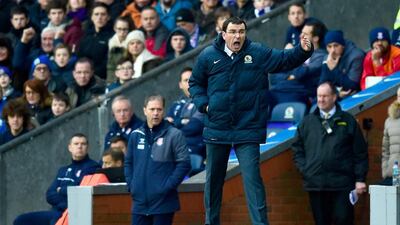Normally when a manager is appointed, his remit is primarily football-related, such as win the league, finish in the top four, secure European football, avoid relegation or earn promotion.
When Gary Bowyer was promoted to take over at Blackburn Rovers in May last year, after two months as caretaker, he said that “the main aim was to keep out of the papers because the headlines were for the wrong reasons”.
To put it bluntly, Blackburn were a laughing stock.
They had completed a season where five managers had a total of six spells in charge, while a global adviser went to war with the chief executive as competing factions fought to run the club.
The managing director, Derek Shaw, was presented by the club as an out-of-control figure in a court case that resulted in Rovers being ordered to pay £2.25 million (Dh12.5m) in compensation to a manager – Henning Berg – who won only one game.
Berg lasted 57 days in charge, and Michael Appleton lasted 67. Rovers had paid excessive wages to over-the-hill footballers, signed a random group of Portuguese players who were rarely heard of again, and went through a cast of 40 as, having aimed for promotion to the Premier League, they almost ended up in League One.
This was not a normal job and Blackburn were not a normal club. They are now, though, and for that, Bowyer deserves credit.
He has brought sanity where there was madness, quiet where there was noise, an understated approach to an overexposed club.
The less the owners – Indian poultry company Venky’s – do the better, and the running of the club has been left in the hands of Shaw (the man slighted by the club’s own lawyer) and Bowyer.
There are working-class towns where times are hard and the area’s identity revolves around its football club, and Blackburn is one such town.
Their supporters are able to have pride in their club again, even though they are not perfect and will not be under the ownership of Venky's. But at least the fans are no longer protesting about the Indian firm by releasing chickens on to the Ewood Park pitch. They focus on football, not farce.
Blackburn have been in the headlines three times in 2015. Their striker Rudy Gestede, signed for £200,000 by Bowyer and now rated at £5m after a dramatic improvement, was wanted by Crystal Palace in the January transfer window.
They then knocked out teams in the upper reaches of the Premier League, Swansea City and Stoke City, in the FA Cup.
Their fourth stint in the spotlight comes this weekend because they face Liverpool tomorrow.
Given the scale of the Merseysiders' renaissance, the chances are that Rovers will not claim a third famous victory.
Bowyer has cut costs, identified players who were undervalued elsewhere and imbued his side with spirit.
Gestede, Tom Cairney, Ben Marshall and Shane Duffy have been fine signings, but the resolutely down-to-earth Bowyer has few of the trappings of a managerial mastermind.
With Blackburn’s squad, they probably ought to be above 10th in the Championship, not 13 points off the play-offs.
Supporters wonder if Bowyer always picks the correct team or opts for the right tactics.
His cup triumphs have come with depleted teams, prompting questions why the supposedly full-strength sides have not been as adept.
Yet none of that detracts from the reality that he was the right man for Blackburn at a particularly troubled time.
Bowyer is reminiscent of the measured and understated Nigel Clough, who is in charge of Sheffield United.
Clough was appointed Derby County manager when the club, who had endured the worst season in Premier League history, appeared in meltdown and, with calm thoroughness, rebuilt a club from the bottom up. Bowyer has done something similar.
Bowyer’s other feat is to survive for two years at the helm of a club where predecessors were struggling to last two months.
He has brought common sense where there was chaos, and it is really quite remarkable.
sports@thenational.ae
Follow us on Twitter at @NatSportUAE


